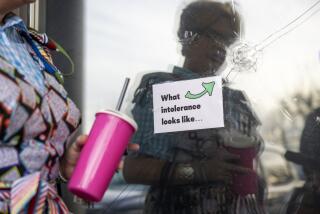U.S. contractors face dangers in Iraq; 1 killed in bombing
Stephen Everhart was brought to Iraq by the U.S. Agency for International Development to assist the University of Baghdad’s business college in qualifying for international accreditation.
He was killed Thursday outside the gates of the university when a powerful bomb commonly used by Shiite Muslim militias detonated.
The attack highlighted the precarious position of contractors for the U.S. government and Embassy as the American military prepares to leave the country.
Militia groups, some with ties to the Iraqi government, are intent on hitting U.S. diplomats, soldiers and contractors employed by the embassy. And it is no longer clear how far Prime Minister Nouri Maliki and his security forces can go in reining the groups.
Civilian contractors working on projects to help build the country’s democracy are also coming under intense pressure from the Iraqi police and army. In the last month, there have been at least four raids by the army and police on USAID contractors’ compounds in Baghdad’s fortified Green Zone.
The deputy head of a USAID program was detained for about a week by the Iraqi security forces; he was released Thursday.
In part, the harsh treatment now is baggage from eight years when Americans had virtual immunity from Iraqi rules, and Iraqi officials came to resent civilian and security contractors who were seldom, if ever, held accountable.
The shooting of 17 Iraqi civilians at a busy traffic square in 2007 by members of Blackwater, then the embassy’s civilian security company, symbolized the excesses of the era.
But events like Thursday’s killing of the USAID contractor and the raids point to a bumpy road ahead as the embassy looks to sort out its new relationship with the Iraqis.
Recent congressional hearings have raised doubts about whether the State Department can in fact guard its diplomats and civilian contractors. U.S. officials have indicated they want the Iraqi government to extend an American military presence past 2011 but, even if approved, U.S. troops will be limited to working with their Iraqi security counterparts.
“Everyone’s conclusion is there are going to be setbacks and it’s going to be difficult, once the U.S. military is out, to secure U.S. personnel and facilities,” said Kenneth Katzman, a Middle East expert with the Congressional Research Service.
What has particularly bedeviled the Americans is whether the Iraqi government is willing to go the extra mile to rein in armed Shiite groups.
Maliki is reliant on the political support of anti-American cleric Muqtada Sadr’s 40-seat parliament bloc to stay in power. Sadr’s Promised Day Brigade militia and rival Shiite factions regularly attack the Americans.
The attacks are a standard topic in the regular meetings between the American Embassy and the prime minister. But it is an open question now whether Maliki has the power in full to confront his government coalition partners about their activities in the street.
Last week, Maliki acknowledged the existence of at least one militia unit in the Interior Ministry during a televised Cabinet meeting.
Professor Everhart’s team had been warned about the danger in the area around the university, which is near Sadr City, the Shiite slum that is home to several anti-American militant groups. The security team for the USAID contractors had received warnings that there was suspicious activity outside the campus, and the bodyguards decided that the Americans should leave. But they apparently came to that conclusion just a bit too late.
As the team drove away, an unseen attacker detonated the bomb as Everhart passed, killing him.
As part of the ongoing violence, at least nine U.S. soldiers have been killed this month in attacks believed to have been carried out by Shiite militants.
The unsettled environment has left U.S. government contractors between a rock and a hard place because, even as they are targeted by armed groups, they also face Iraqi army and police raids at their compounds in the Green Zone.
The raids are believed to be under the supervision of Maliki’s son, Ahmed, according to Iraqi and Western sources, as Iraqi officials seek to regain control of the Green Zone.
On June 14, the company RTI, which has run the USAID’s project to promote local governance, was told to produce a lease for its compound or it would be evicted in two days. The company decided to move, but 30 armored cars were confiscated because they were not properly registered. The army and police units also took documents on the company’s Iraqi personnel. An RTI official in Baghdad declined to comment on the incident.
At the same time, the compound for Aecom, which runs USAID’s Legislative Strengthening Project, was searched and a senior civil servant detained for about a week.
Jamal Abukhadijeh, who was the program’s deputy head, was released Thursday by Iraqi security forces who had arrested him after they found an Iraqi army uniform in his room. Iraqi security forces have also raided two other compounds in the Green Zone housing USAID contractors and their security details.
Former Deputy Interior Minister Adnan Assadi said the security forces were reining in U.S. security contractors that operated outside the law and had illegally acquired property.
The U.S. Embassy acknowledged the current tensions.
“USAID ensures that all of its contractors, including RTI and Aecom, abide by all current U.S. and Iraqi laws and regulations,” embassy spokesman David Ranz said. “We do realize the transition will occasionally be rocky as the government of Iraq adjusts to a U.S. government presence that is civilian-led and principally diplomatic and developmental in scope.”
More to Read
Start your day right
Sign up for Essential California for news, features and recommendations from the L.A. Times and beyond in your inbox six days a week.
You may occasionally receive promotional content from the Los Angeles Times.






